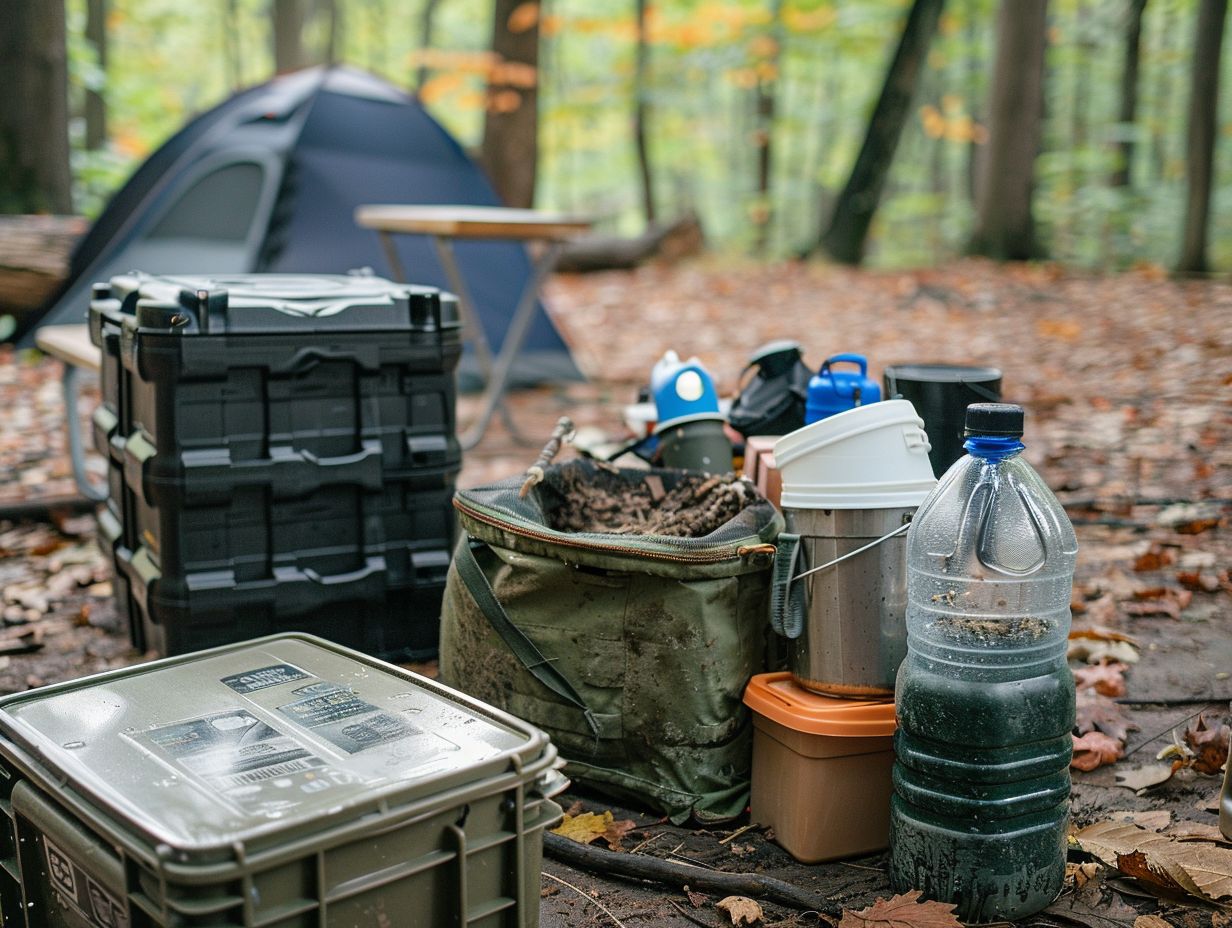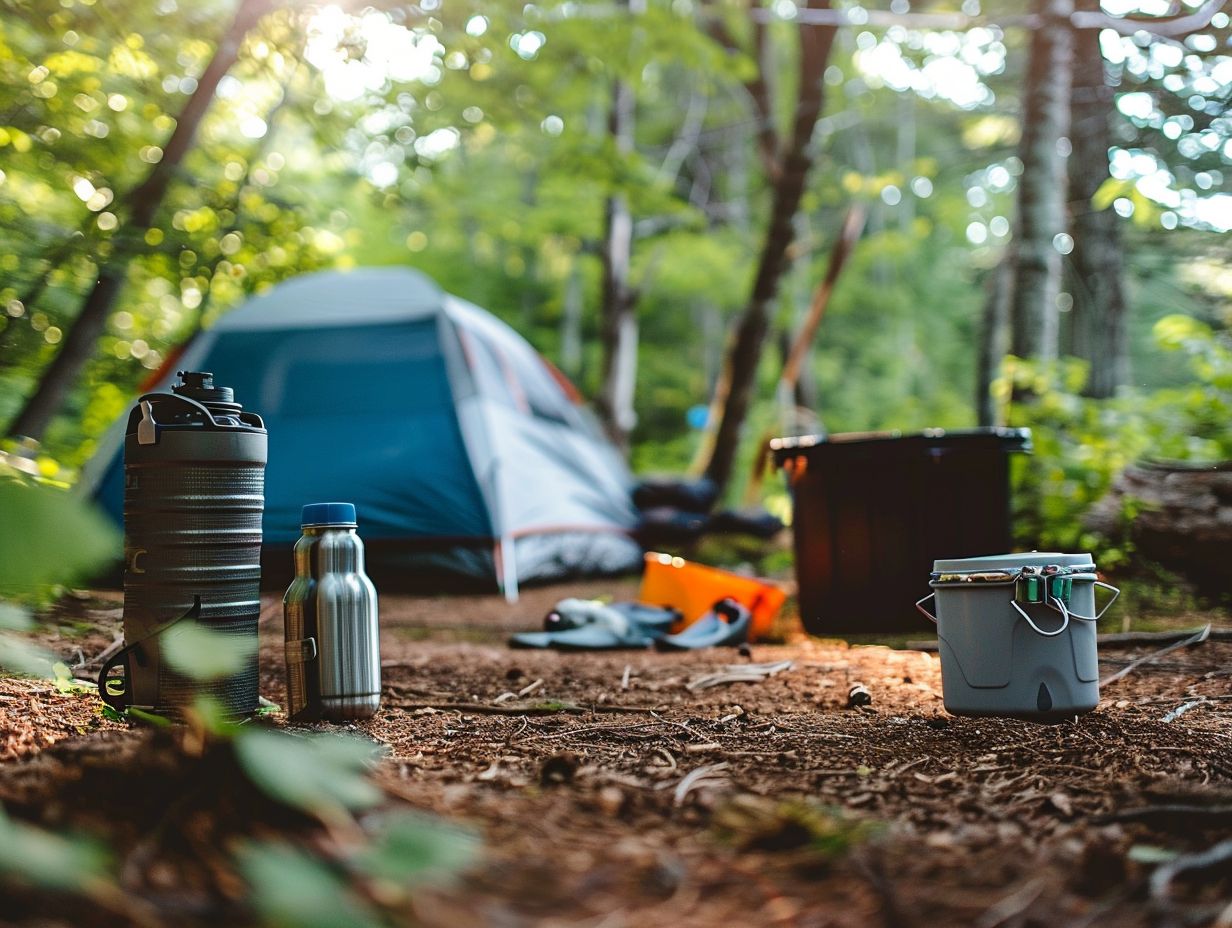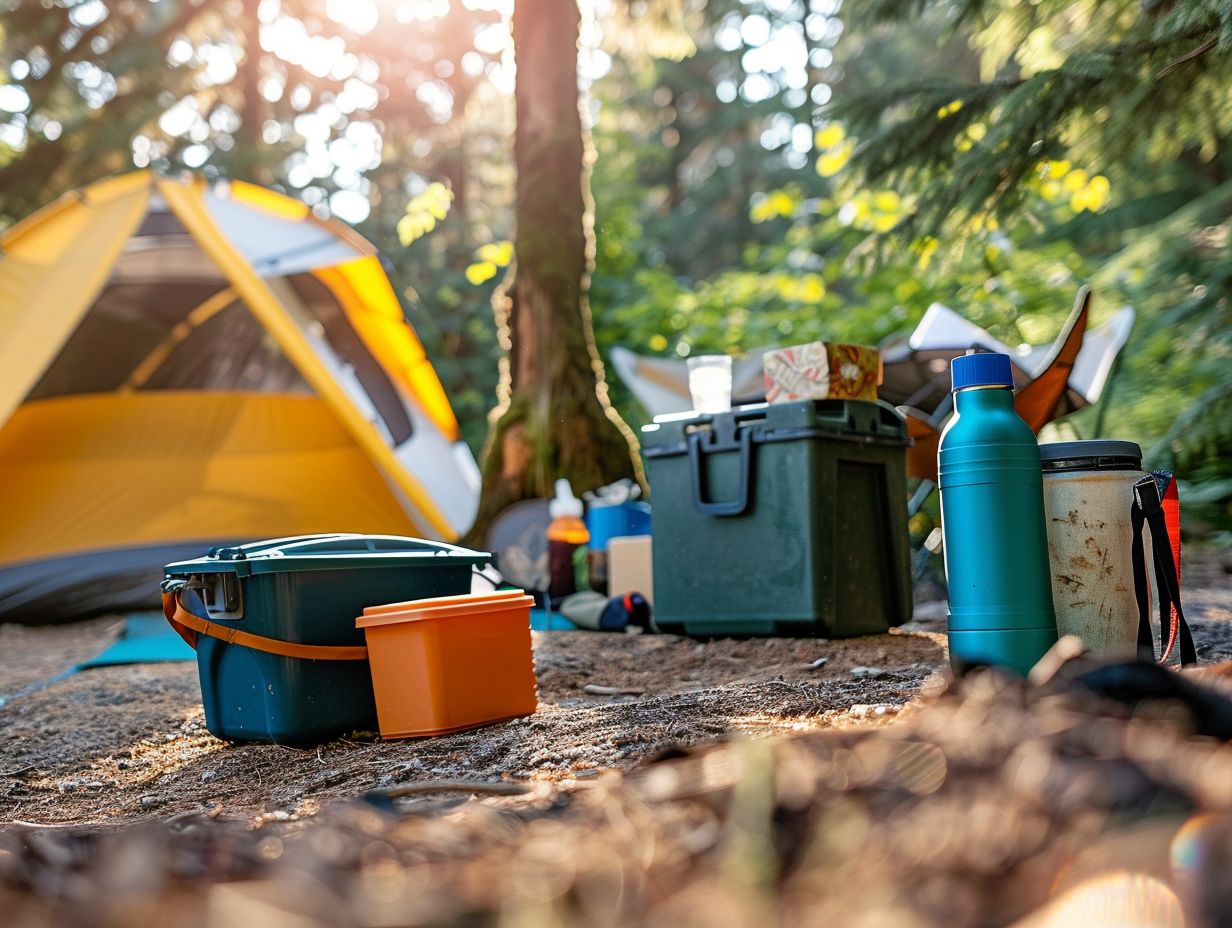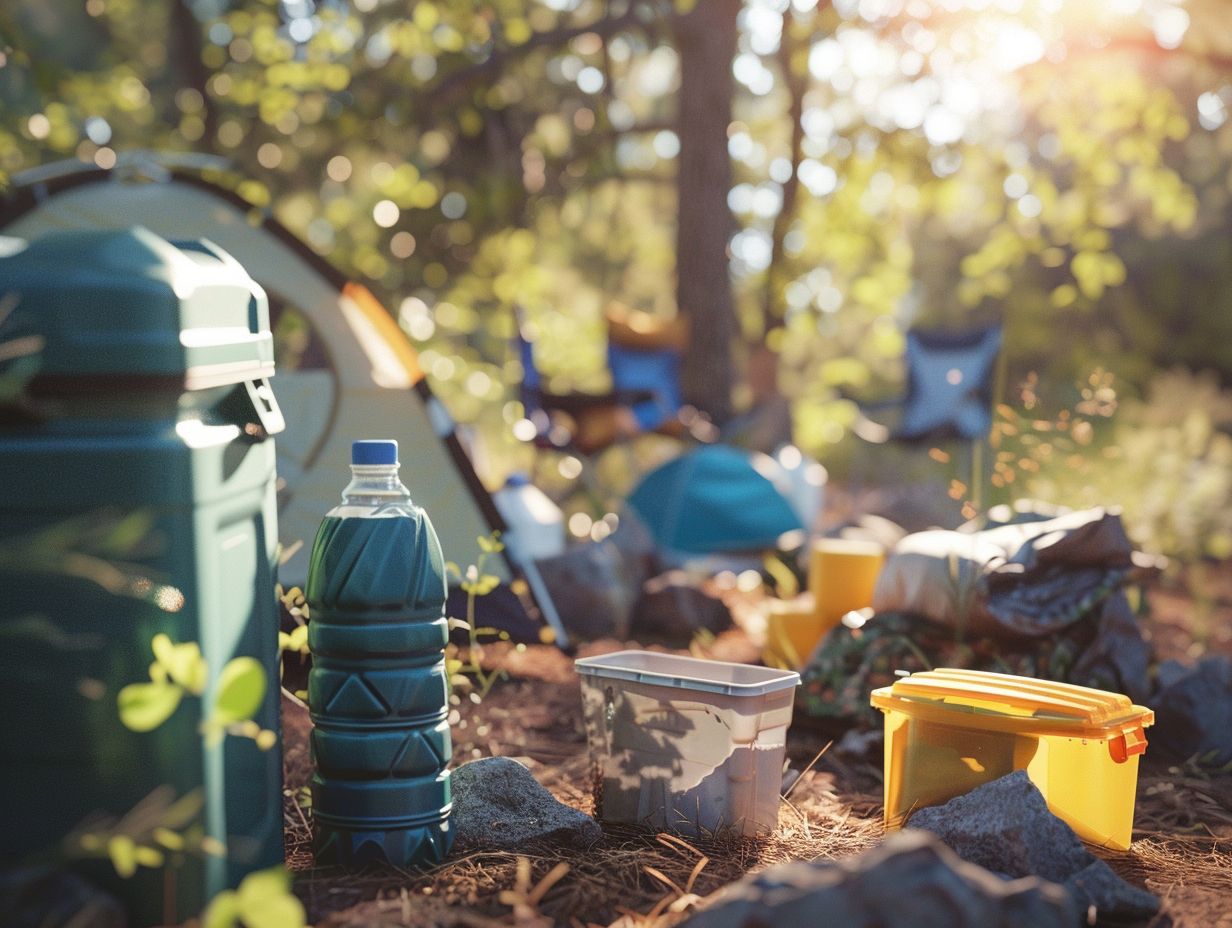If you are a nature enthusiast who enjoys spending time in the great outdoors, it is crucial to consider the environmental impact of your camping trip.
Ten practical tips for reducing waste while camping will be explored, ranging from meticulous meal planning to composting food scraps.
Learn about the advantages of waste minimisation, the typical types of waste produced during camping, and sustainable camping methods.
Join in as we delve into ways you can responsibly appreciate nature and contribute to preserving our planet for future generations.
Key Takeaways:

- Plan your meals carefully to reduce food waste and pack only what you need.
- Use reusable containers and utensils to minimise single-use items and reduce waste.
- Bring your own water bottle to avoid using disposable plastic bottles and reduce plastic waste.
Plan Your Meals Carefully
Careful meal planning is crucial for a successful camping trip, ensuring you have the appropriate food items, portion sizes, and cooking tools for each meal.
In terms of meal preparation before embarking on a camping expedition, choosing non-perishable items is essential. These items not only have an extended shelf life but also necessitate minimal refrigeration, making them practical for outdoor excursions.
Creating a menu in advance aids in determining the meals to cook and guarantees a well-rounded mix of nutrients and flavours. Preparing your ingredients ahead of time not only saves time but also streamlines meal preparation when you’re in the great outdoors.
By organizing everything efficiently and having easy access to supplies, you can devote more attention to relishing the natural environment.
Use Reusable Containers and Utensils
Opting for reusable containers and utensils is a sustainable choice that reduces waste and minimizes the need for single-use items during your camping adventures. Reusable containers and utensils, such as packable cutlery and storage containers, offer a range of benefits that make them ideal companions for any outdoor activity. Their durability ensures they can withstand the rigors of camping trips, making them long-lasting and cost-effective.
These products are easy to clean, allowing for quick and efficient maintenance while on the go. By opting for reusable options, you not only reduce your environmental impact but also contribute to a more sustainable and eco-friendly lifestyle. Make a positive difference by embracing these practical and environmentally-conscious choices for your next outdoor excursion.
Bring Your Own Water Bottle
Bringing your own water bottle is a simple yet impactful method to reduce plastic waste and stay hydrated during your camping trips. Opting for a reusable water bottle not only reduces the environmental footprint of single-use plastic bottles but also supports conservation efforts.
Globally, an estimated 1 million single-use plastic bottles are bought every minute, leading to extensive pollution in oceans and natural ecosystems. Reusable water bottles, made from robust materials such as stainless steel or BPA-free plastic, are perfect for outdoor activities, ensuring you have a reliable hydration source without harming the environment.
Well-known brands like Hydro Flask, Nalgene, and CamelBak offer a variety of portable and eco-friendly water bottles designed for camping, including insulated choices and collapsible bottles for easy packing.
Pack Light and Efficiently
Efficient packing is crucial for minimising waste and ensuring a smooth camping experience. By following these guidelines, you can focus on enjoying nature without unnecessary clutter or excess gear.
When preparing for your camping trip, begin by creating a checklist of essential items such as a tent, sleeping bag, cooking supplies, and appropriate clothing. Choose multipurpose items to save space and decrease the number of individual items you must pack. It’s also beneficial to repackage items into reusable containers or bags to reduce waste.
Avoid packing unnecessary items that could become dead weight and instead concentrate on versatile gear that can fulfil multiple needs in different scenarios.
Choose Eco-Friendly Camping Gear
Choosing eco-friendly camping gear is a proactive measure you can take to support sustainable outdoor experiences, aid conservation initiatives, and decrease your environmental impact while immersing yourself in nature.
By selecting camping gear made from biodegradable materials, you play a role in reducing waste generation and preserving natural resources. Eco-friendly camping equipment frequently includes energy-efficient elements like solar-powered lanterns and portable solar panels, enabling you to utilise renewable energy sources during your outdoor excursions.
Numerous sustainable choices available in the market feature robust designs intended for long-term use, minimising the necessity for frequent replacements and consequently lessening your overall environmental footprint.
Dispose of Waste Properly

Proper waste disposal is critical for maintaining the cleanliness of camping grounds and safeguarding the environment from the detrimental consequences of litter and improper waste handling.
It is imperative for campers to adhere to responsible waste management practices to ensure minimal impact on nature. Separating recyclables from regular waste aids in streamlining the recycling process and decreasing the volume of waste destined for landfills.
Using designated rubbish bins provided in camping areas not only maintains the cleanliness of the surroundings but also promotes appropriate disposal methods. Practising “pack in, pack out” principles ensures that no evidence of your visit remains, preserving the natural splendour of the wilderness for future visitors to appreciate.
Use Natural Alternatives to Chemical Products
When camping, opting for natural alternatives like biodegradable soap and composting organic waste can minimise your impact on the environment and align with the principles of waste reduction and sustainability.
Biodegradable soaps, derived from plant-based ingredients, naturally break down, reducing the harm to water sources and ecosystems. By choosing biodegradable soap over traditional options while camping, you can help preserve the wilderness you are exploring. Not only does it benefit personal hygiene, but it also leaves minimal residue compared to conventional soaps.
Composting food scraps during camping trips presents a sustainable solution for managing organic waste, enriching the soil rather than adding to overcrowded landfills. Embracing natural alternatives like these has the potential to enhance your outdoor experience and cultivate a deeper connection with nature.
Minimise Single-Use Items
Reducing reliance on single-use items is a key strategy for minimising waste and environmental impact while camping, promoting sustainable practices and resource conservation. When you opt for reusable products such as water bottles, cutlery, and containers, you can significantly reduce the amount of plastic waste generated.
Additionally, practising portion control can help in minimising food waste, as leftovers often result in more rubbish. Investing in quality gear that can be used multiple times instead of disposable alternatives is another effective way to reduce your environmental footprint while camping.
By embracing these alternatives and implementing practical waste reduction tips, you can contribute to a greener and more eco-friendly camping experience.
Compost Food Scraps
Composting food scraps in the wilderness or backcountry areas is a responsible way for you to manage organic waste, enrich the soil, and support a circular approach to waste reduction.
When you’re camping, composting offers various benefits beyond waste management. By composting food scraps, you can significantly reduce greenhouse gas emissions, as organic waste in landfills generates methane, a potent greenhouse gas.
Composting improves soil quality by adding nutrients back into the earth, promoting healthier plant growth in the surrounding area. By setting up a compost bin in outdoor settings, you can minimise overall waste generation during your trip, fostering a more sustainable and eco-friendly camping experience.
Respect the Environment
Respecting and protecting the natural environment whilst camping involves making conscious choices, taking responsible actions, and making a commitment to preserving the beauty and integrity of outdoor spaces.
When camping, it is important to be mindful of wildlife habitats and avoid disturbing or feeding animals. This helps in maintaining the ecological balance of the area. Additionally, sticking to designated trails can help reduce erosion and minimise human impact on fragile ecosystems.
Leaving no trace behind is a critical aspect of camping. All waste should be properly disposed of or recycled to ensure the environment remains pristine for future visitors. Embracing sustainable practices, such as using eco-friendly camping gear and recycling materials, can further enhance the eco-consciousness of camping adventures.
How Can You Reduce Waste While Camping?
Reducing waste whilst camping involves embracing a zero waste philosophy, adopting sustainable practices, and modifying your camping habits to minimise environmental impact and promote conservation. An efficient way for you to reduce waste during camping trips is by carefully planning your meals to avoid excess food consumption and packaging waste.
Opt for reusable containers and utensils over disposable ones. Remember to bring along a rubbish bag to collect any waste, ensuring that all items are disposed of properly.
Embracing the concept of ‘leave no trace‘ is essential. Make sure to clean up after yourself and take all your rubbish with you when leaving the campsite.
Utilise biodegradable products whenever possible, such as natural soaps and compostable materials. Keep in mind that every small eco-friendly choice you make contributes to a greener camping experience.
What Are the Benefits of Reducing Waste While Camping?

Reducing waste whilst camping offers numerous benefits to you, including:
- The preservation of natural landscapes
- The reduction of pollution
- The promotion of a culture of sustainable camping for both current and future generations
When you actively participate in waste reduction efforts, you are significantly decreasing the overall environmental impact, which leads to improved air and water quality in camping areas. By embracing sustainable camping practices, you are contributing to the safeguarding of wildlife habitats and the promotion of biodiversity. This not only allows you to appreciate nature’s beauty in its untouched state but also positions you as a key player in the long-term conservation of our natural environment. Sustainable camping practices play a vital role in preserving ecosystems, ensuring that future generations can partake in outdoor experiences without posing a threat to nature’s delicate balance.
What Are the Most Common Types of Waste Generated While Camping?
Common types of waste generated whilst camping include food packaging, single-use items, plastic waste, and non-biodegradable materials, emphasising the importance of implementing sustainable waste management practices.
- One significant source of waste during camping trips is food packaging. To address this issue, campers can choose to use reusable containers instead of disposable packaging. By bringing reusable food storage bags and containers, individuals can minimise the volume of waste produced.
- Similarly, focusing on reducing the use of single-use items like cutlery and plates can lead to a substantial decrease in the amount of rubbish generated. Investing in lightweight yet durable reusable utensils and dishware offers a sustainable solution that aids in reducing disposable waste.
- Opting for eco-friendly camping gear such as biodegradable soaps and toiletries can also play a role in decreasing environmental impact.
How Can You Practice Leave No Trace Principles While Camping?
Practising Leave No Trace principles involves minimising your environmental impact, respecting wildlife habitats, and leaving camping areas as pristine as you found them to protect the Earth’s natural beauty.
One crucial principle for you to adhere to is disposing of waste properly. It is imperative that you pack out all rubbish, including food scraps and biodegradable items. Leaving behind any litter must be avoided at all costs, as it can have detrimental effects on wildlife and can lead to pollution in the ecosystem.
Respecting wildlife requires that you observe animals from a distance, refrain from feeding them, and steer clear of disrupting their natural behaviours.
When camping, it is vital that you confine yourself to designated areas in order to prevent damage to fragile ecosystems. Opt for durable surfaces when pitching your tent, such as established campsites or rocky areas, to minimise your impact on vegetation.
What Are Some Sustainable Camping Practices?
Engaging in sustainable camping practices involves utilising eco-friendly gear, minimising waste, and supporting conservation efforts to have a positive impact on the environment and encourage others to do the same.
By integrating renewable energy sources like solar panels or wind turbines, you can significantly decrease your carbon footprint while enjoying the outdoors. Conserving water through the use of low-flow showerheads and collecting rainwater for camping needs is another method of practising sustainability.
Promoting low-impact recreational activities such as hiking and birdwatching aids in preserving natural habitats. Opting for eco-friendly kitchen products like reusable silicone food bags, bamboo utensils, and biodegradable dish soap can further enhance your environmentally conscious camping experience.
How Can You Educate Others About Reducing Waste While Camping?
Educating others about waste reduction whilst camping involves raising their awareness about the environmental impact of litter, promoting recycling practices, and sharing sustainable strategies for minimising waste in outdoor settings. This educational outreach is crucial for fostering a culture of environmental responsibility among campers.
By organising workshops focused on sustainable camping practices, individuals can learn practical tips on waste reduction, such as the proper disposal of rubbish and the importance of leaving no trace behind in natural areas.
Distributing informational materials, such as leaflets or online guides, can further guide campers on eco-friendly habits, from using reusable containers to selecting biodegradable products.
Setting a positive example through personal actions not only inspires others but also establishes a norm of conservation and mindfulness towards the environment.
Frequently Asked Questions
What are some tips for reducing waste while camping?

There are several ways you can reduce waste while camping, such as using reusable containers, bringing biodegradable products, and properly disposing of waste.
How can I pack food in a more eco-friendly way for camping?
Instead of using plastic bags or containers, opt for reusable containers or beeswax wraps. You can also plan meals that require minimal packaging and bring reusable utensils and plates.
What are some eco-friendly alternatives to disposable items while camping?
Instead of using disposable plates, utensils, and cups, bring reusable ones. You can also use biodegradable wipes and bring a portable water filter instead of purchasing bottled water.
How can I minimise the amount of waste I produce while camping?
Start by planning your meals and only bringing the necessary amount of food. Avoid overpacking and bringing disposable items. Make sure to properly dispose of waste and leave your campsite cleaner than you found it.
What should I do with my waste while camping?
You should always properly dispose of waste in designated receptacles or by following Leave No Trace principles. Make sure to separate recyclables and non-recyclables and avoid leaving any waste behind.
Can I compost while camping?
Yes, you can compost while camping by using a portable compost bin or burying food waste in a designated area. Just make sure to follow local regulations and avoid composting meats, oils, and dairy products.



